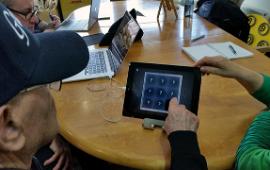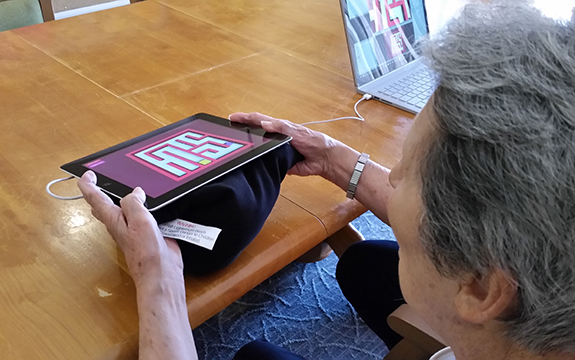Communicating with dementia

In Summary
- Swinburne design researchers are developing innovative technologies for people living with dementia
Associate Professor Sonja Pedell and researchers Stu Favilla and Jeanie Beh from Swinburne’s School of Design, develop innovative technologies for people living with dementia. They have been working with dementia groups in the City of Wyndham “Ageing Well” program in Victoria, Australia, for four years.
Since last year, the team has been developing apps with Dementia Australia supported by Andrew Murphy, designer and software developer, at Swinburne.
“We are now developing four iPad apps due for release later this year, via a project called, ‘A Better Visit’, in collaboration with aged care provider, Lifeview Residential Care, at their four sites in Victoria.

Improving conversation between residents with advanced dementia and their visitors is the central focus of ‘A Better Visit’.
The idea behind, A Better Visit, is to create easy-to-use interactive apps for enjoyable, shared experiences and improved conversation for residents with advanced dementia during a visit with family members.
“For twelve months, we have explored resident and visitor interests, their needs and suitable interaction mechanisms on the iPad. In a co-design process. The apps have been developed and are now refined enough to be evaluated over the next few months,” says Associate Professor Pedell.
Improving the visit experience for the resident and the visitor, is the central focus. The apps help the resident to experience simple forms of content creation and impact through movement on the screen.
The visitor has a concrete platform to initiate conversations and shared interactions. One visitor commented, “This is fantastic, sometimes I get wary of hearing my own voice and looking for new subjects to talk about.”
Augmented Reality app in development for people with moderate dementia
Last year, Associate Professor Pedell and her colleagues Stu Favilla, James Berrett, Dr Alison DeKruiff, Bridgette Engeler (Communication Design and Digital Media Design Department), Professor Tino Fuss, Dr Udi Weizmann, Dr Nicole Aimers (Centre for Design Innovation) and Dr Ahsan Morshed (Data Science Research Institute) won a tender to create an Augmented Reality or AR application to support the independence of people living with mild to moderate dementia.
“We will apply a user-centred design approach giving participants a strong voice in the process; carefully considering individual needs, preferences and emotions during development,” explains Pedell.
Enhanced by AR to provide additional and tailored guidance, the technology will be a software interaction that will support daily tasks and increase independence.
The project comprises several stages, with home visits including interviews and future use scenarios, design and development of a high-level prototype, and trialling the prototype intervention using a combination of standard protocols and qualitative interviews with participants and their immediate support network.
The technology will also aim to fulfil a design aesthetic that is non-stigmatising and non-patronising, criteria suitable for commercial distribution.
Results will inform future innovative technology development, government policies and programs concerning the use of technology to assist adults living with dementia.
“Our aim is to increase quality of life and to reduce costs associated with future care as people will remain at home for longer,” explains Associate Professor Pedell.

